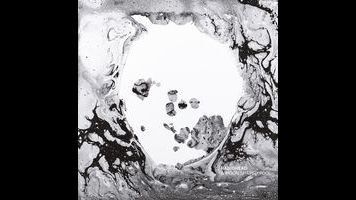Radiohead burns itself clean with a tense and pained new album

For a band that has so significantly reinvented its sound over nearly 25 years’ worth of recordings, the mood of Radiohead’s music has remained remarkably consistent—a mood that might best be described as “troubled.” A sense of unease and tension runs through nearly the entirety of the band’s catalog, from the jagged guitar blasts of “Creep,” to the snakelike guitar lines of “Paranoid Android,” on through the electronic pulses of “2 + 2 = 5” and the jittery rhythms of “Morning Mr. Magpie.” Radiohead’s soul has remained stubbornly grounded in anxiety, even (or especially) as its music has gotten more experimental and ambitious.
Similarly, as a lyricist, Thom Yorke has returned to many of the same issues and obsessions time and again, even as his utterances became more elliptical and abstract, especially following the release of OK Computer. His concern with the environment, politics, and emotional weaknesses and fears run through all the band’s work, along with a knotty fascination with science, sci-fi, and end-times paranoia. A Moon Shaped Pool, the band’s difficult and downbeat new album, isn’t a profound reinvention or bold statement of purpose (à la Kid A or In Rainbows, respectively) so much as a discovery of how to integrate the varying elements of the band’s sound. The King Of Limbs felt half-finished, as though the group could see where it wanted to go, but wasn’t quite certain how to get there. Now those musical ingredients have come together, but the result is a more challenging listen. There’s no “Lotus Flower” here; instead, there’s an assemblage of nervy soundscapes, riven through with rhythms both languid and icily pulsing, that evoke a melancholic sensibility.
The third track on the record, “Decks Dark,” captures well the overall tenor of A Moon Shaped Pool: It’s both downbeat and smooth, with a rhythm that manages the trick—constant throughout the record—of being simultaneously drowsy and hypnotically entrancing. Those qualities suffuse the music here, of which the most marked difference is the heavy addition of Jonny Greenwood’s string arrangements and the presence of a choir, both provided by the London Contemporary Orchestra. Greenwood’s soundtrack work, though a different beast, has (perhaps unavoidably) bled into the arrangements here. What felt incomplete or undercooked on Limbs now stands as a conceptual tactic, a means of creating musical pieces that are more like interconnected soundscapes than songs. Many of the tracks contain only one theme, of which the ensuing musical journey explores various permutations of that dominant concept. Songs expand or contract a single melody—or, more often, merely a motif—as though seeking to tease out the most compelling variant, before subsiding. Things like verses and refrains are mostly absent, so if the mood-music refinements of the last couple albums struck you as unsatisfying, there’s little here to intrigue.
But for those willing to grapple with the headier pleasures of such experimentation, there are rewards buried among the moody meanderings. “Burn The Witch” is the closest the band comes to a more traditional song structure, and it’s easily the most immediate (and arguably best) track on Pool, the obvious choice for album opener. It’s followed by “Daydreaming,” the second song premiered in advance of the album’s release, and the two make an evocative case for the kind of transitions found throughout. It pivots from the former’s all-tension-no-release buildup to the soulful, searching mood of the latter, built upon a piano progression of almost Philip Glass-like simplicity and repetition. “Dreamers, they never learn,” Yorke croons, “It’s too late, the damage is done.” This isn’t a tribute to the dreamers, it’s a death sentence. As swirling synths begin to overtake the melody (a regular occurrence on Pool), the sounds spiral upwards, and it’s like watching a funnel cloud take shape.







































